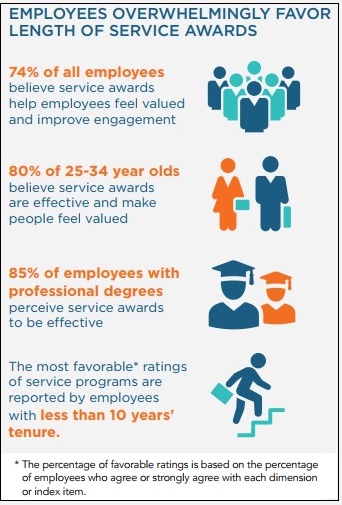The battle for talent is as fierce as it has been in nearly a decade, prompting business leaders to reexamine people strategies and practices in order to be competitive. It’s also underscoring the importance of employee recognition – and for good reason. According to the 2017 Trendicators Report, recognition plays an important role in recruiting, onboarding, engaging, and retaining employees. The report is based on a survey of 1,500 job seekers, including 940 active and 507 passive job seekers.
Best-in-class organizations create recognition programs that combine diverse elements while also bringing their unique brand, values and goals to life. There are many types of employee recognition and rewards programs, including:
- Service-based recognition to celebrate service anniversaries, successful onboarding, retirement and other career milestones;
- Performance-based recognition to encourage specific behaviors, achievements, or demonstration of company values;
- And social recognition, such as peer-to-peer recognition, often enabled by technology to amplify the social experience company-wide.
The majority of companies have a formal length-of-service program in place today, according to the 2016 Trendicators report, based on a survey of 5,000 employees across the United States, covering all major industries and demographics. This was true even in companies identified as NOT utilizing best practices in employee recognition (76%); of course it was higher, at 90%, among companies that do follow best practices in this area.
Service awards are still relevant
While some think service awards are losing relevance, the research indicates just the opposite — that they are still highly relevant and effective. The 2016 report reveals that 74% of all respondents believe service awards help employees feel valued and improve engagement. It may surprise you to learn that 80% of millennials agree. This is higher than any other generational cohort; for example, only 60% of boomers gave the same response.
According to the research, employers benefit as well. Companies with service award programs enjoy employee engagement scores that are 25 points higher than those without such programs, as well as higher (24 points) business performance confidence scores. All of this indicates that it may be time for a refresh. Service award programs are here to stay, and companies that have active, relevant programs will have an edge in the war for top talent.
Innovative approaches = Measurable results
Traditional service awards involve a physical award or keepsake, but in some programs employees receive points for performance-based recognition. They then can use those points to get a reward of their choice from an online catalog, such as merchandise from top brands. Research shows that non-cash awards have a more favorable impact on elevating employee engagement and organizational performance, as tangible awards help foster the bond between the employee and the organization.
Employers definitely see a return on that investment. For example, at my company, Engage2Excel, we track performance analytics for our clients. Reporting for one of our most prominent healthcare customers reveals that employees active in the recognition program are 31% more productive than their less active peers, and our advanced analytics has been able to attribute 7% of the difference to the recognition program itself. Also, a positive statistical correlation was found to exist between participation in the recognition program and employee turnover and retention.
Recognition pays off before the hire
In addition to the employee experience, you also should take a fresh look at the candidate experience from a recognition perspective. The 2017 Trendicators report reveals that recognition is very important during the attraction, recruitment, and onboarding stages. Of all candidates surveyed, for example, 61% said that receiving a personalized welcome gift at the time of the offer would influence their acceptance of the offer.
Again, millennials stand apart from other cohorts, with 82% holding this opinion. That means getting personal makes good sense. You can make the offer a special moment by sending a personalized welcome gift to the candidate’s home. It might be swag with the company logo, and it can be even more impactful if the gift affirms the company vision or values. This type of onboarding also promotes your employment brand, impressing not only the candidate but also family and friends.
Yet, in a random straw poll of HR professionals, two-thirds said they offer no form of recognition during onboarding.
It’s hard to underestimate the importance of recognition. According to the 2017 report, the number one reason people seek other employment is a lack of recognition, appreciation and respect. That reason came in higher, at 24%, than compensation (18%) and job fit (16%). It’s also the number one reason people accept offers, with 35% of responses. Further, 70% of all respondents want to understand the recognition programs you offer and will look to your career website to get information. Among active candidates, it’s even higher, at 81%.
More and more leaders are recognizing the impact employee recognition has on engagement and business performance – it’s no surprise that nearly one-third of organizations expect their recognition and rewards budget to increase over the next year. If you’re looking for an ROI that you can take to your CFO, implementing an effective recognition and rewards program will help you add more value to your business.
